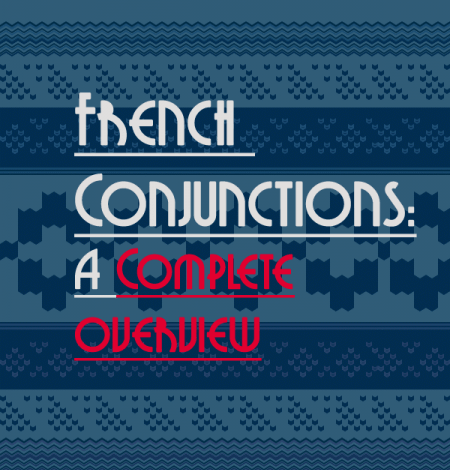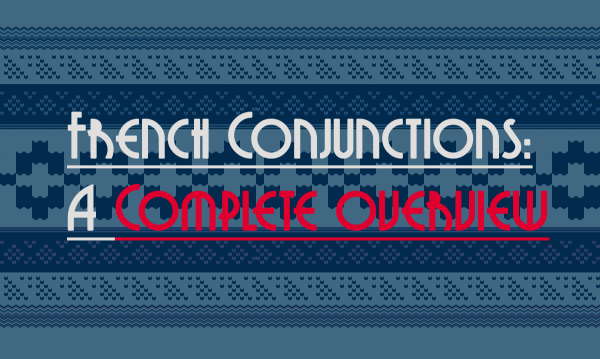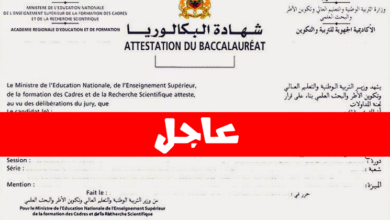
Want to brush up on French conjunctions and looking for an easy way to do it? This little guide will help!

So, what exactly is a conjunction?
Of course you know social media and you know what its main role is. It is used to facilitate the interaction between people, or, in other words, to CONNECT people. In language, you would also need something to CONNECT things.
You need a conjunction when:
Some might say that French conjunctions are a bit confusing because many of them include “que”, so it’s hard to know how to choose a good conjunction. There is no better way, but you’ll have to structure your knowledge, and reading this article will help tremendously.
Here we go!
French Coordinating Conjunctions
There are 7 coordinating conjunctions in French: “mais”, “ou”, “et”, “donc”, “or”, “ni”, “car”. Those are invariable words that are used to join words or clauses that have equal value. Below examples will help you understand better their meanings and uses:
| Conjunction | English translation | Example |
| mais | but | C’est cher mais de très bonne qualité It’s expensive, but very good quality |
| ou | or | Nous allons au cinéma ou nous allons au supermarché We go to the cinema or we go to the supermarket |
| et | and | Marc et Alice vont à la plage Marc and Alice go to the beach |
| donc | so,therefore | C’est donc toi! So it was you! |
| or | now,yet | Il faut tenir les délais, or, ce n’est pas possible The deadlines must be met, now this is not possible |
| ni | neither…nor | Il ne veut ni l’argent ni les cadeaux He wants neither money nor gifts |
| car | because | Il reste calme car il est gentil He stays calm because he is nice |
French Subordinating Conjunctions
Subordinating conjunctions are used to join a subordinating clause (dependent clause) to main clauses.
Actually, there are only a few subordinating conjunctions: comme, quand, lorsque, puisque, que, quoique, si. However, we usually encounter what is called the « conjunctive phrases » (locutions conjonctive). These are groups of two or more words that have the same function as a conjunction. French’s conjunctive phrases usually end with “que”.
Still Stuck at Intermediate French?

Break through the plateau with our proven coaching and study method.
Let’s talk about the simple coordinating conjunction first. The table below provides the use of each conjunction with an example:
| Conjunction | English translation | Explanation | Example |
| comme | as, since | Use to compare or indicate a cause | Elle est blanche comme la neige She is as white as snow |
| puisque | as, since | Indicate a subordinating cause | Puisque je suis ici, ne t’inquiète pas As I am here, don’t worry |
| quand(*) | when | Indicate a cause or a condition (similar to “si”) | Je pars quand tu arrives I leave when you come |
| lorsque | when | Indicate a cause (similar to “quand”) | L’indiscipline se comprend losqu’on est enfant |
| que | that | Introduce a completive subordinating clause | Je crois qu’il viendra demain I believe that he will come tomorrow |
| quoique | eventhough | Indicate two ideas in opposition | Je commence à progresser quoique le français soit une langue difficile. I start to make some progress eventhough French is a difficult language. |
| si | if | Indicate a condition or hypothesis | Si tu arrives à l’heure je t’accepterai en cours If you come on time I will accept you to class |
The list of all conjunctive phrases is too big to be imported in this article. Here I classify them by meaning so you could have an idea how to use them in French.
| Type | Conjunctions | Example |
| objective conjunctions | de manière (que), en sorte que, pour que… | Je vous donne ce texte pour que vous puissiez le travailler à la maison I will give you this text so that you could work on it at home |
| cause conjunctions | parce que, alors que… | Je ne viendrai pas parce que mon fils est malade I will not come because my son is ill |
| opposition conjunctions | bien que, malgré que, sauf que, sans que… | Je ne peux pas te faire passer bien que tu aies fait des progrès I can’t let you pass although you have made progress |
| time conjunctions | Avant que, à mesure que, après que, depuis que… | Il est parti avant que je vienne He left before that I come |
| comparison conjunctions | autant que, tel que, de même que | Travaillez autant que vous pouvez Work as much as you can |
| condition conjunctions | à condition que, au cas où, à moins que…. | Je te laisserai entrer à condition que tu ne fasses pas de bêtises I will let you enter on condition that you did not do stupidities |
The more you familiarize these conjunctions in French and how to use them, the more it will become easier for you speak French.
When using subordinating conjunction in French, you’ll need to memorize the mood/tense that follows the verb. For the mood, ask yourself this question “Do I need the indicative, subjunctive OR conditional mood with this conjunction”? Try to learn the rule for common conjunctions that you use. As for the tense, make your decision based on the meaning of each tense.
Quick recap
I hope this article helped organize your knowledge about French conjunctions.
Your turn!
Let’s put the lesson to the test! Try using the conjunctions in the lesson above and write your own sentences in French. Share it with us in the comments!
Still Stuck at Intermediate French?

Break through the plateau with our proven coaching and study method.
Here are some FAQs about French Conjunction
What is “conjunction” in French?
How do you use conjunctions in French?
To connect two ideas together in a sentence. In the same way you use “but” or “and” in English, we do the same in French! At first, it may be confusing to get the hang of French conjunctions. Be sure to carefully read the article and practice using conjunctions to improve your sentences!
How do you use the conjunction “or” in French?
Ou is one of the 7 coordinating conjunctions that link words or clauses that have the same value. In the case of ou, here is an example:
On peut aller au cinéma ou au supermarché.
We can go to the cinema or to the supermarket.
What are the 5 most common conjunctions?
Five of the most common French conjunctions:
- Et (and)
- Que (that)
- Ou (or)
- Comme (like/as)
- Si (if)
What are 10 examples of conjunctions in French?
- C’est pas mal mais je veux un autre cadeau. (It’s not bad but I want another present.)
- J’aime les fleurs car elles sont belles sur ma table. (I like flowers because they are beautiful on my table.)
- Mon bébé est gros comme un melon ! (My baby is fat like a melon.)
- Il croit que sa sœur arrivera demain. (He hopes that his sister will arrive tomorrow.)
- Je suis arrivé après que tu es parti. (I arrived after you left.)
- En cas où tu fais quelque chose de stupide, j’ai un plan d’urgence. (In case you do something stupid, I have a contingency plan.)
- J’évite mon mec parce qu’il veut parler. (I’m avoiding my man because he wants to talk.)
- C’est donc toi ! (So it was you!)
- On peut aller au cinéma ou au musée. (We can go to the cinema or the museum.)
- Mon mari cuisine de peur que ma cuisine soit toxique. (My husband cooks for fear that my cooking is toxic/poisonous.)




